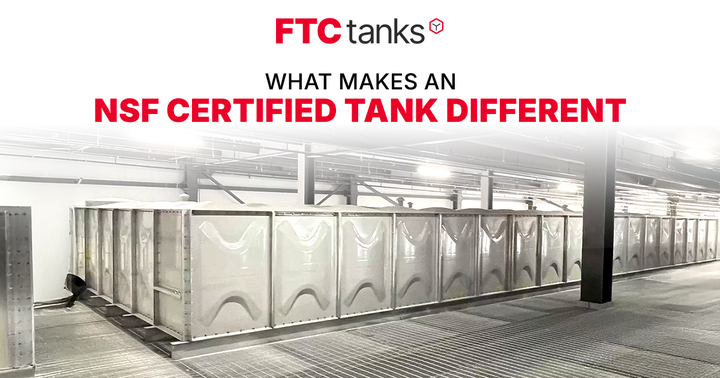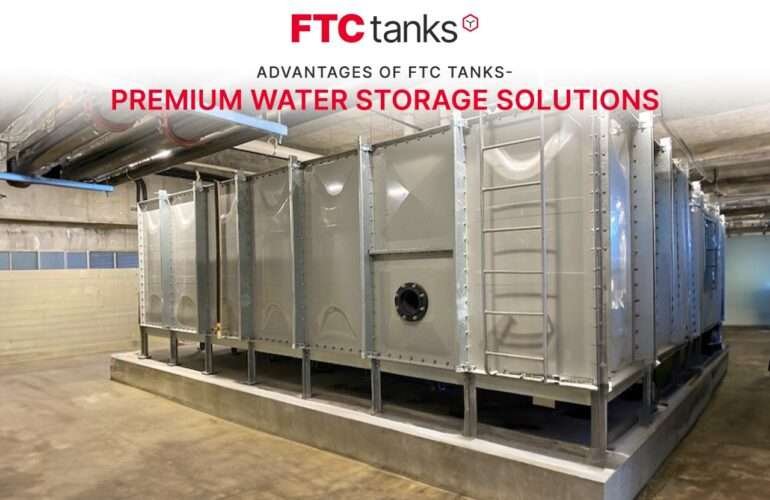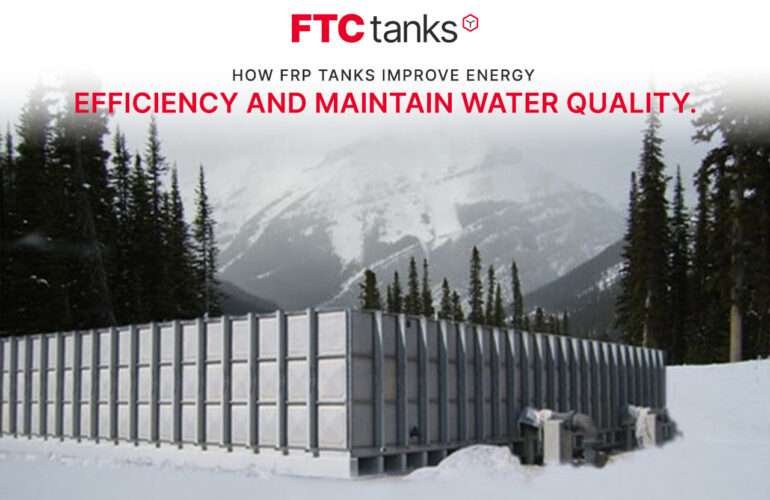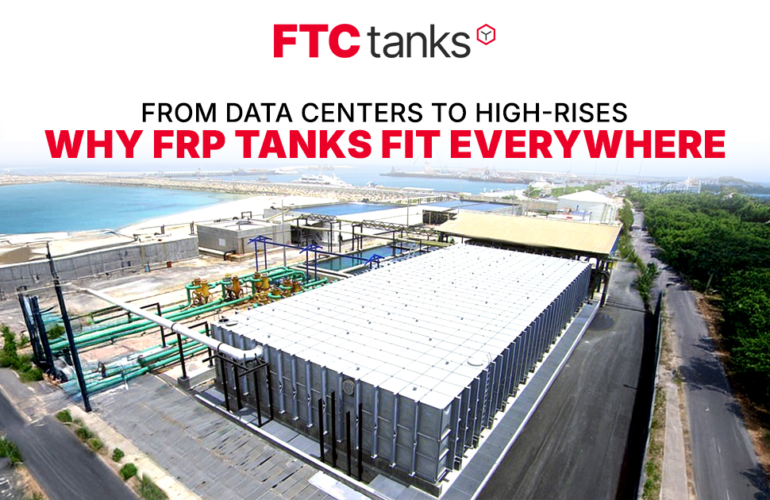Safe water storage is never something to gamble with. Families, businesses, and communities all rely on strong, dependable water storage tanks every day. But not every tank meets the same standards. That’s where NSF certification makes the difference.
Unlike ordinary tanks, those built with NSF/ANSI/CAN 61 and NSF/ANSI 372 certified materials are proven safe for storing drinking water. Choosing them means cleaner water, fewer compliance issues, and real peace of mind.
This guide explains what NSF certification means, why it matters, and how certified FRP tanks deliver long-term reliability.
Understanding NSF Certification
NSF International is a global authority in product safety and public health standards.
For potable water storage, the most common standards are:
- NSF/ANSI/CAN 61: Drinking Water System Components (ensures materials won’t leach harmful substances).
- NSF/ANSI 372: Lead content compliance (ensures very low or no lead).
At FTC, our FRP tank panels and sealants carry NSF-61 and NSF-372 certification. This guarantees that the parts in contact with water meet strict safety requirements.
The result? Confidence that stored water remains safe for daily use.
The Science Behind NSF Certified Tanks
What sets certified tanks apart is the materials inside them.
A certified FRP water tank is built from fiberglass-reinforced plastic that resists corrosion and holds strong for decades. Unlike steel, FRP doesn’t rely on liners, coatings, or paints that wear out. In fact, FTC tanks require no liners or coatings at all, because our panels and sealants are already NSF certified.
NSF testing covers:
- Pressure and load resistance
- Chemical leaching
- Compliance with safe lead levels (NSF 372)
For potable use, this means a water cistern or industrial water storage tank can safely store drinking water without introducing harmful contaminants.
Benefits of Choosing NSF Certified Water Tanks
When people shop for a tank, they often compare size and cost. But what truly matters is what happens after installation. Certified water storage tanks deliver value long after the purchase.
Safe Drinking Water
Health is non-negotiable. Certified tanks prevent harmful chemicals from entering the water. They don’t guarantee a bacteria-free system, but they ensure the materials won’t contribute to bacterial growth. With proper operation and cleaning, a certified water cistern keeps supplies safe for families, farms, and industries.
Long-Term Cost Savings
Cheaper, uncertified tanks often bring hidden costs. Cracks, contamination, and frequent replacements pile up over time. Certified FRP tanks resist corrosion and last longer, lowering the total cost of ownership.
Compliance and Trust
Municipalities, industries, and regulators look for certification. Certified tanks pass inspections faster and meet the strictest water safety standards. That means less stress and smoother approvals.
NSF-Certified vs. Non-Certified Tanks
At a glance, uncertified and certified tanks may look alike. But the risks of uncertified options run deep.
- Uncertified tanks may leach chemicals, allow bacterial growth, or fail under stress.
- NSF certified tanks use tested materials that keep water safe and pass inspections with ease.
| Feature | NSF-Certified Tanks | Non-Certified Tanks |
| Safety | Materials tested for chemical leaching | Risk of harmful chemical release |
| Hygiene | Won’t promote bacterial growth | High risk of algae/bacteria buildup |
| Strength | Built for durability | Cracks and leaks are common |
| Compliance | Recognized by regulators | May fail inspections |
| Reliability | Trusted for potable use | Failure risk during demand |
| Cost Over Time | Lower upkeep, longer lifespan | Frequent repairs, higher costs |
The difference is clear: certified tanks reduce risks, save money, and protect public health.
Who Should Invest in NSF Certified Tanks?
The simple answer: anyone storing water for people or operations.
- Municipalities: Public drinking water supplies must be safe and dependable.
- Industries: Many production processes rely on uncontaminated water.
- Homeowners: Certified FRP water tanks give families clean and safe storage
High-rise buildings and domestic buildings also benefit from certified tanks. Even when water isn’t directly consumed, it still matters. The water you shower with, wash your face in, or use to clean dishes and clothes should be free from harmful leaching. NSF certified tanks safeguard this everyday water, ensuring safety across all household and residential needs.
Be it daily usage or emergencies, FTC Tanks provides peace of mind. Our NSF-61 and NSF-372 certified tanks are engineered for safe storage and long service life. Built with certified materials, they remain reliable under extreme conditions and are tested to withstand fire exposure, so you can trust them when it matters most.
Key Features to Look for in Certified Tanks
Not every certified tank is equal. Here’s what to focus on:
- Capacity: From small cistern to large municipal tanks.
- Application: Potable water, industrial supply, or emergency reserves.
- Durability: Certified water storage tanks built for decades of use.
- Reputation: Trusted manufacturers like FTC with a history of safe designs.
Maintenance and Care of Certified Tanks
Certification is step one; proper care is step two. To extend life and performance:
- Inspect the FRP water tank regularly for cracks or wear.
- Clean the water cistern to avoid sediment buildup.
- Monitor fittings and seals to keep the system airtight.
- Follow the FTC’s care guidelines for reliable performance.
With routine checks, certified tanks serve communities and businesses for decades.
Why FRP Tanks Lead the Way
Fiberglass-reinforced plastic (FRP) has become the material of choice for certified storage tanks. Here’s why:
- Lightweight yet extremely strong
- Corrosion-resistant in harsh conditions
- Modular design allows easy transport and installation
- Long service life with low maintenance
- NSF-61 and NSF-372 certified panels and sealants
FTC’s FRP water tanks combine all these benefits without relying on liners, coatings, or paints. That makes them both reliable and cost-efficient.
Final Takeaway
Choosing a water storage tank isn’t just about size—it’s about safety, compliance, and long-term value.
NSF-certified water tanks protect supplies, lower risks, and meet strict standards for potable use. With NSF-61 and NSF-372 certified panels and sealants, FTC tanks deliver confidence that uncertified systems cannot.
From a water cistern at home to industrial scale FRP tanks, the choice is clear. Safe water starts with certified materials.
If you’re ready to invest in proven solutions, FTC Tanks is here to help. Our tanks combine certified safety, corrosion-resistant FRP, and decades of expertise.
When it comes to water, compromise is never an option. Choose NSF certification. Choose FTC Tanks.





